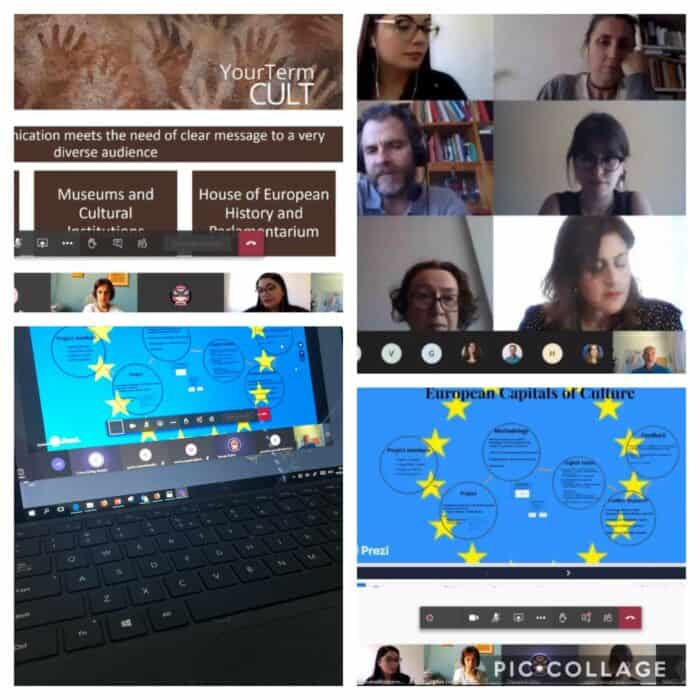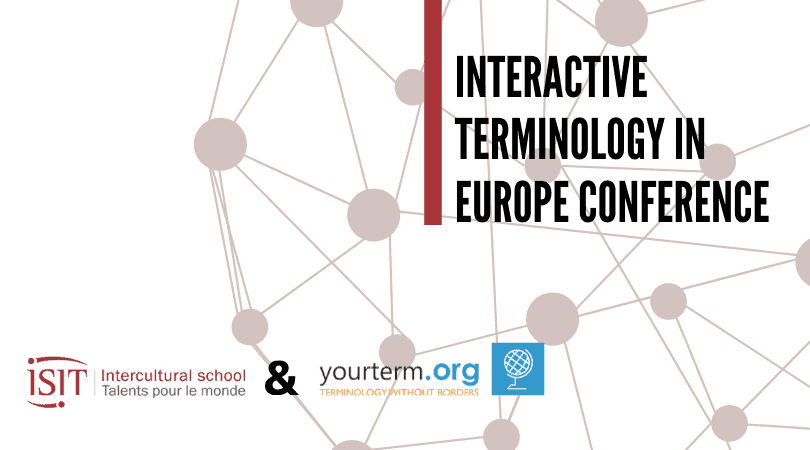On 19th May 2020, ISIT students defended the project that they started on October 2019 in collaboration with TermCoord. They compiled a corpus of 29 texts in French from official sources as well as from online journalistic sources to extract 110 terms about the European Capitals of Culture. During their defence, they presented their way of working and the difficulties they may have encountered in the creation of this glossary.
This project is part of the “Terminology without Borders” project initiated by TermCoord, which aims to improve communication in multiple areas by adapting terminology to the needs of citizens.
 A conference on the YourTerm CULT project organized by ISIT followed this defence. The conference, which took place on Zoom, started with an introduction by Rodolfo Maslias, head of TermCoord. He presented the work, the structure and the values of TermCoord and exposed the role of terminology at the European Parliament. He presented IATE and all the different platforms the unit uses for working and for sharing terminology.
A conference on the YourTerm CULT project organized by ISIT followed this defence. The conference, which took place on Zoom, started with an introduction by Rodolfo Maslias, head of TermCoord. He presented the work, the structure and the values of TermCoord and exposed the role of terminology at the European Parliament. He presented IATE and all the different platforms the unit uses for working and for sharing terminology.
Eva Gozlan, trainee at TermCoord and ISIT student, then introduced “Terminology without Borders” and the five different projects it comprises. She presented the workflow for each project with four main steps: gathering corpora and extracting terminology to create glossaries, searching for equivalents and terminological information by students and individual terminologists or translators to enrich the glossaries, reviewing the terms by experts from each fields and finally inputting the results in IATE.
She then presented in more detail each project and particularly the project YourTerm CULT, which currently comprises three different areas. These were later presented more in detail by the partners working on it, who were also speaking during the conference.
The students of ISIT, Sophie Eyssette, Cécile Mayeres, Angelica Marino and Léopoldine Godon presented their work on European Capitals of Culture and shared their final glossary with 110 terms in French and their English equivalents.
Crina Herteg, a professor from the university of Alba Iulia in Romania introduced how she proceeded with her students to find the Romanian equivalents of the French terms in the European Capitals of Culture glossary. They complied two parallel corpora, one in English and one in Romanian. The corpora included bids submitted by Romanian cities in order to become European Capitals of Culture. The students worked on finding the equivalents and with the help of a concordance tool, the students checked the occurrences of the terms in the corpus, as well as contextual examples.
Elpida Loupaki, a professor from the university of Thessaloniki in Greece along with her student Evita Tzamtzi presented their work on the European Capitals of Culture. They introduced their presentation with the methodology they adopted to work on this project. They found the equivalents of the French terms in Greek and they searched for the terminological information in English such as definition or context to better understand the concepts of these terms. They worked with monolingual, comparable corpora and created three sub-corpora: official documents from EU sources, academic papers and press articles. They worked with Sketch Engine, a corpus management tool.
Beate Früh, a professor from the university of applied sciences of Anhalt in Germany, presented how she will work on finding the German equivalents of the French terms in the glossary about European Capitals of Culture and also suggested that the group of partners meets again to discuss how to ensure a consistency in the project in terms of gathering corpora and extracting terminology.
Finally, Daniel Miguelañez, a professor from the university of Alcalà de Henares in Spain introduced his project on museums of natural science. He is working on a frame based approach to collect corpora, extract terminology, create entries and complete terminological information.
The aim of this conference was to share the experience of all participants on how they work on terminology. It was also an occasion for discovering new tools: a concordance tool called EDICT, a corpus management and text analysis tool called Sketch Engine, and an arborescence tool called XMind.
 By Eva Gozlan. She is currently validating her Master’s degree in Translation and International Communication at ISIT School.
By Eva Gozlan. She is currently validating her Master’s degree in Translation and International Communication at ISIT School.

